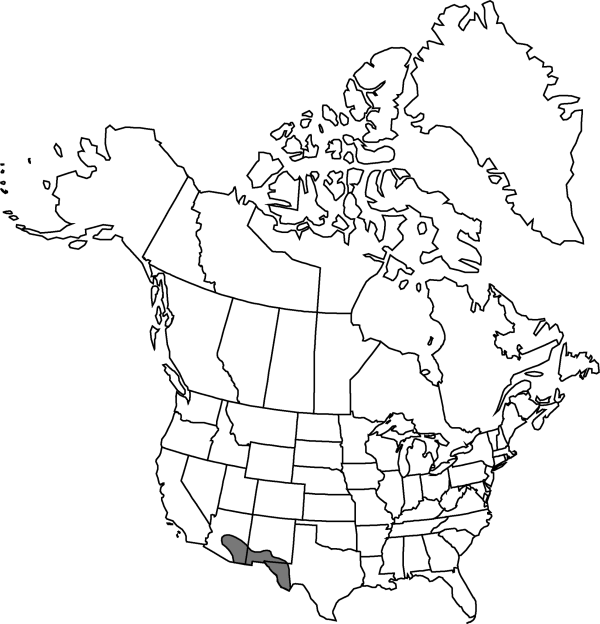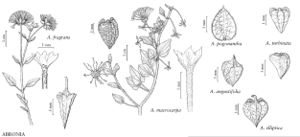Difference between revisions of "Abronia angustifolia"
Pittonia 3: 344. 1898.
FNA>Volume Importer |
imported>Volume Importer |
||
| (7 intermediate revisions by 2 users not shown) | |||
| Line 6: | Line 6: | ||
|place=3: 344. 1898 | |place=3: 344. 1898 | ||
|year=1898 | |year=1898 | ||
| + | }} | ||
| + | |special_status={{Treatment/ID/Special_status | ||
| + | |code=F | ||
| + | |label=Illustrated | ||
}} | }} | ||
|basionyms= | |basionyms= | ||
| Line 11: | Line 15: | ||
|name=Abronia angustifolia var. arizonica | |name=Abronia angustifolia var. arizonica | ||
|authority=(Stan dley) Kearney & Peebles | |authority=(Stan dley) Kearney & Peebles | ||
| − | }}{{Treatment/ID/Synonym | + | |rank=variety |
| + | }} {{Treatment/ID/Synonym | ||
|name=Abronia torreyi | |name=Abronia torreyi | ||
| − | |authority= | + | |authority= |
| + | |rank=species | ||
}} | }} | ||
|hierarchy=Nyctaginaceae;Abronia;Abronia angustifolia | |hierarchy=Nyctaginaceae;Abronia;Abronia angustifolia | ||
| Line 22: | Line 28: | ||
}}<!-- | }}<!-- | ||
| − | --><span class="statement" id="st- | + | --><span class="statement" id="st-undefined" data-properties=""><b>Plants </b>annual (perennial). <b>Stems</b> decumbent to ascending, much branched, elongate, often reddish, glandular-pubescent, viscid. <b>Leaves</b>: petiole 1–7 cm; blade ovate-oblong to elliptic, 1–5.5 × 0.7–3 cm, margins entire to sinuate, often ± undulate, infrequently shallowly lobed, surfaces viscid-pubescent. <b>Inflorescences</b>: peduncle longer than subtending petiole; bracts lanceolate to oblong-lanceolate, 5–10 × 1–3 mm, papery, glandular-pubescent; flowers 10–30. <b>Perianth</b>: tube pink, 10–20 mm, limb bright magenta to pale pink, infrequently pale rose, 6–8 mm diam. <b>Fruits</b> broadly obdeltate in profile, 5–10 × 4–8 mm, scarious, apex narrowly tapered to a prominent beak; wings 5, extending to or slightly beyond base of beak, truncate, with conspicuous dilations, cavities extending throughout.</span><!-- |
-->{{Treatment/Body | -->{{Treatment/Body | ||
| + | |phenology=Flowering spring–fall. | ||
|habitat=Sandy soils, desert scrub | |habitat=Sandy soils, desert scrub | ||
|elevation=300-1300 m | |elevation=300-1300 m | ||
| Line 37: | Line 44: | ||
-->{{#Taxon: | -->{{#Taxon: | ||
name=Abronia angustifolia | name=Abronia angustifolia | ||
| − | |||
|authority=Greene | |authority=Greene | ||
|rank=species | |rank=species | ||
| Line 44: | Line 50: | ||
|basionyms= | |basionyms= | ||
|family=Nyctaginaceae | |family=Nyctaginaceae | ||
| + | |phenology=Flowering spring–fall. | ||
|habitat=Sandy soils, desert scrub | |habitat=Sandy soils, desert scrub | ||
|elevation=300-1300 m | |elevation=300-1300 m | ||
| Line 50: | Line 57: | ||
|publication title=Pittonia | |publication title=Pittonia | ||
|publication year=1898 | |publication year=1898 | ||
| − | |special status= | + | |special status=Illustrated |
| − | |source xml=https:// | + | |source xml=https://bitbucket.org/aafc-mbb/fna-data-curation/src/2e0870ddd59836b60bcf96646a41e87ea5a5943a/coarse_grained_fna_xml/V4/V4_128.xml |
|genus=Abronia | |genus=Abronia | ||
|species=Abronia angustifolia | |species=Abronia angustifolia | ||
| − | |||
| − | |||
| − | |||
| − | |||
| − | |||
| − | |||
| − | |||
| − | |||
| − | |||
| − | |||
| − | |||
| − | |||
| − | |||
| − | |||
| − | |||
| − | |||
| − | |||
| − | |||
| − | |||
| − | |||
| − | |||
| − | |||
| − | |||
| − | |||
| − | |||
| − | |||
| − | |||
| − | |||
| − | |||
| − | |||
| − | |||
| − | |||
| − | |||
}}<!-- | }}<!-- | ||
-->[[Category:Treatment]][[Category:Abronia]] | -->[[Category:Treatment]][[Category:Abronia]] | ||
Latest revision as of 21:56, 5 November 2020
Plants annual (perennial). Stems decumbent to ascending, much branched, elongate, often reddish, glandular-pubescent, viscid. Leaves: petiole 1–7 cm; blade ovate-oblong to elliptic, 1–5.5 × 0.7–3 cm, margins entire to sinuate, often ± undulate, infrequently shallowly lobed, surfaces viscid-pubescent. Inflorescences: peduncle longer than subtending petiole; bracts lanceolate to oblong-lanceolate, 5–10 × 1–3 mm, papery, glandular-pubescent; flowers 10–30. Perianth: tube pink, 10–20 mm, limb bright magenta to pale pink, infrequently pale rose, 6–8 mm diam. Fruits broadly obdeltate in profile, 5–10 × 4–8 mm, scarious, apex narrowly tapered to a prominent beak; wings 5, extending to or slightly beyond base of beak, truncate, with conspicuous dilations, cavities extending throughout.
Phenology: Flowering spring–fall.
Habitat: Sandy soils, desert scrub
Elevation: 300-1300 m
Distribution

Ariz., N.Mex., Tex., n Mexico (Chihuahua, Coahuila).
Discussion
Plants on gypsum flats and knolls of White Sands, New Mexico, are perennial, but may flower in their first season.
Selected References
None.
